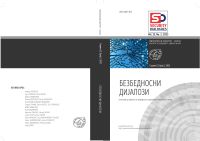GLOBAL SECURITY TRENDS IN EURO-ATLANTIC AREA AND NATO NEW STRATEGIC CONCEPT
GLOBAL SECURITY TRENDS IN EURO-ATLANTIC AREA AND NATO NEW STRATEGIC CONCEPT
Author(s): Igor Gjoreski, Zoran NacevSubject(s): Social Sciences
Published by: Филозофски факултет, Универзитет "св. Кирил и Методиј"
Keywords: security trends; challenges; hybrid warfare; climate changes
Summary/Abstract: The states face complementary with both conventional and non-conventional threats to global security and peace. If yesterday someone thought that conventional conflict in Europe is not possible, today it has to think differently. Contemporary threats are in symbiosis with global security trends that significantly affect resilience and direct the security of countries. Terrorism, hybrid warfare, cyber threats, climate changes, icecaps melt and new transport corridors open, such as the Northern Sea Route in the High North, outer space, Emerging and Disruptive Technologies (EDTs), scarcity of energy the security, threats posed by Russia, a competitive challenge of China as well as EU energy and economic challenges, upgraded by the EU geo-strategic partnership, the current threat of more frequent periodic pandemic presence, are some part of the trends, challenges and threats which countries in the Euro-Atlantic area are faced. The fast changing and rapidly evolving nature is a common feature of modern security trends, challenges and threats. Dealing with indicated security trends and threats requires fundamental changes in the mind set of perception of security by redefining the concepts of security and reorganizing the global security architecture in Euro-Atlantic Area. States often face an invisible adversary who is both their ally and their common enemy. Hybrid warfare and cyber threats are specifics warfare in alternative space, where “the battles” being fought in cyberspace, through disinformation, disintegration and the abuse of Internet through malicious operations on social networks. These clashes are more like battles of narratives in cyberspace than real - time battles on the battlefield. The multitude of information, i.e. disinformation that is placed, confused the public, and no one knows where it is and what the truth is. The challenge of such warfare affects the security of state sex pressed through the implications of their defence, multiplying the instability that leads to new vulnerabilities and crises. Artificial intelligence, EDTs presents at the same time are both, a new opportunities and risk, and together they are a key element for maintaining the military and technological edge of the states. The control of outer space is becoming increasingly important for the security as well as for the economy, energy and prosperity of states with far-reaching consequences that can have a destructive impact similar as conventional warfare. Consequently, each international organization and institution builds its own concept and strategy to dealing with such security trends, challenges and threats. The report of the reflection group “NATO 2030: United for a New Era” is a NATO’s vision for dealing with such global security trends, challenges and threats in the next decade and beyond. This document provides guidance on how the Alliance will adapt to new global security trends, challenges and threats. The practical operationalization of the mechanisms for dealing with them is expected to be formalized with the New Strategic Concept of the Alliance, announced by the NATO Secretary General Stoltenberg to be adopted in mid-2022. The EU, for its part, has developed a Strategic Compass. Only the UN seems to be resistant on the change. However, the efficiency of new concepts and strategies for dealing with contemporary challenges remains to be tested in practice.
Journal: Bezbednosni dijalozi
- Issue Year: 13/2022
- Issue No: 2
- Page Range: 23-35
- Page Count: 13
- Language: English

